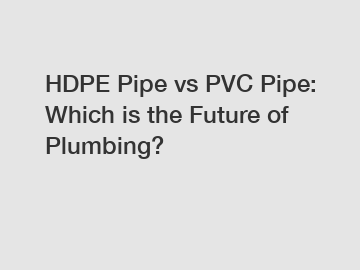HDPE Pipe vs PVC Pipe: Which is the Future of Plumbing?
In the ever-evolving world of plumbing, two materials have gained significant traction in recent years: High-Density Polyethylene (HDPE) and Polyvinyl Chloride (PVC) pipes. Both these materials offer unique properties and advantages, leading to a debate about which one holds the key to the future of plumbing. In this blog, we will explore the characteristics, pros, and cons of HDPE and PVC pipes to help you make an informed decision.
1. Why HDPE Pipes?
HDPE pipes are known for their flexibility, durability, and longevity, making them increasingly popular in plumbing applications. The key features of HDPE pipes include:

a) Corrosion Resistance: HDPE pipes are highly resistant to corrosion from chemicals, making them suitable for a wide range of plumbing systems.
b) High Flexibility: The flexibility of HDPE pipes allows for easy installation, especially in areas with uneven terrain or changing ground conditions.
c) Leak-Proof Joints: HDPE pipes are fused together using heat, creating seamless joints that are resistant to leaks. This eliminates the need for additional joint sealants.
d) Longevity: HDPE pipes have a lifespan of over 50 years, even under challenging conditions, making them a cost-effective choice in the long run.
2. Advantages of PVC Pipes:
On the other hand, PVC pipes have been a staple in the plumbing industry for decades. Let's explore their advantages:
a) Affordability: PVC pipes are generally less expensive than HDPE pipes, making them a popular choice for budget-conscious projects.
b) Light Weight: PVC pipes are lightweight, making them easier to handle and install, particularly in above-ground plumbing systems.
c) Smooth Interior: PVC pipes feature a smooth interior that promotes efficient water flow and reduces pressure loss.
d) Chemical Resistance: PVC pipes possess remarkable resistance to various chemicals, making them suitable for a wide range of plumbing applications.
3. Environmental Considerations:
Both HDPE and PVC pipes have certain environmental considerations that need to be addressed. HDPE pipes are made from petroleum-based materials, while PVC pipes are produced using chlorine and ethylene extracted from natural gas. However, HDPE pipes are 100% recyclable, making them more environmentally friendly and sustainable. PVC pipes can be recycled as well, but the process is more complex due to their chemical composition.
4. Bursting the Myths:
There have been concerns surrounding the use of PVC pipes due to the presence of phthalates and other potentially harmful chemicals. However, advancements in PVC pipe manufacturing have significantly reduced the use of such additives, making them safe for plumbing applications. It is important to stay informed and ensure you are using certified materials from reputable manufacturers.
5. The Future of Plumbing:
As we consider the future of plumbing, it is crucial to account for factors such as sustainability, durability, and ease of installation. While PVC pipes have been the go-to choice for many years due to their affordability and ease of installation, HDPE pipes offer longer durability and better resistance to corrosion. This makes HDPE pipes an attractive candidate for plumbing systems that demand additional strength and longevity.
Conclusion:
In the ongoing debate of HDPE pipe vs PVC pipe, both materials have their unique advantages and applications. While affordability and ease of installation have traditionally favored PVC pipes, HDPE pipes provide better durability, corrosion resistance, and overall longevity. As the plumbing industry evolves towards more sustainable practices, HDPE pipes seem to be gaining traction due to their recyclability and reduced environmental impact. Ultimately, the choice between HDPE and PVC pipes should be based on the specific requirements of each plumbing project, keeping in mind factors such as cost, durability, and environmental considerations.
For more HDPE pipe for water supply specifications, hdpe water service pipe, hdpe floaterinformation, please contact us. We will provide professional answers.
234
0
0

Comments
All Comments (0)